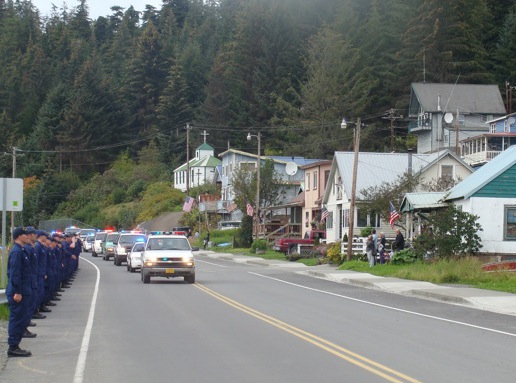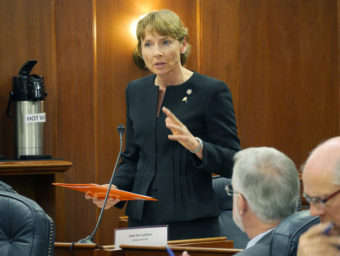
The survivors of law enforcement officers and firefighters who die in the line of duty continue to face uncertainty over health insurance. That’s because the two houses of the legislature couldn’t agree on a bill to provide benefits during the recent special session.
State Trooper Sgt. Patrick “Scott” Johnson was just two and a half years from ensuring that his family would have health benefits through age 65 when he and Trooper Gabe Rich were killed in a shooting in 2014.
This left Johnson’s widow Brandy fearful she would lose health coverage. Since then, the administrations of Govs. Sean Parnell and Bill Walker have extended insurance to the survivors of Johnson, Rich and Trooper Tage Toll, who died in a helicopter crash in 2013. And while they’ll have coverage through next June, Johnson said it’s uncertain beyond then.
“It’s frustrating,” Brandy Johnson said. “I am not the type of person to, you know, ask for things. But this is something that my husband would have earned for our family. For me to have to ask for something that I feel he’s already earned – it’s kind of humiliating in a way.”
She and the other families supported legislation that would make this coverage permanent, saying they were doing it for future survivors of those who die in the line of duty.
The legislature failed to pass that bill in the regular session that ended in May, so Gov. Bill Walker included it in his call for the first special session this year. House Bill 4002 would limit benefits to surviving spouses for 10 years or remarriage, and to children until age 19 — or 23 for college students.
The House passed it 34-0 on Saturday and adjourned.
But senators in the majority caucus said the House gave them no time to review what it had done. And since the House left Juneau, the Senate wouldn’t have been able to make changes. So the Senate adjourned on Sunday without passing the bill.
This procedural disagreement upset survivors. Toll’s widow Nikki Toll said the two houses should have worked together.
“Politics is a fickle thing and, you know, we’re the ones learning, and … yeah, it’s hard to put into words that frustration,” Nikki Toll said.
Walker decided against including the bill in his call for another special session starting on July 11. A spokeswoman said the session is limited to those bill directly related to the governor’s fiscal plan.
Johnson said Walker should have added the bill to the session, considering how close it was to passing.

Anchorage Republican Sen. Cathy Giessel said the Senate supports the governors’ actions to provide benefits to survivors. And she noted the legislature provided funding for the benefits in the budget starting July 1. But, she said, the Senate wasn’t given time to work on the bill.
“The Senate was prohibited from making any changes in the bill, or having any input into it, because of the fact that the House had adjourned,” Giessel said.
Anchorage Democratic Rep. Les Gara expressed concern about what the inability to pass the bill would mean for the special session, when the legislature will work on more contentious bills.
“If you take any signals from the Senate Republican refusal to pass the easiest bill, to help survivors of killed troopers and firefighters and police, you know, it’s a dysfunctional place where bills are getting blocked — even the easy ones,” Gara said. “So, it’s going to be a tough lift.”
Giessel said it was the Senate that led the work on major bills that passed this year, including reforms to criminal justice and Medicaid that will save the state money.
If Walker doesn’t add the bill to the special session agenda, the legislature won’t be able to consider it again until next session, in January.
